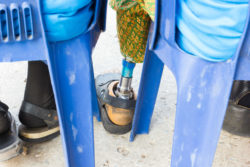 Numerous Invokana (canagliflozin) patients have allegedly had to undergo a diabetes foot amputation due to the type-2 diabetes medication failing to prevent ulcers and lower limb swelling.
Numerous Invokana (canagliflozin) patients have allegedly had to undergo a diabetes foot amputation due to the type-2 diabetes medication failing to prevent ulcers and lower limb swelling.
One of the most recent patients to report a diabetes foot amputation comes from Texas, who opted to file legal action against Johnson & Johnson for failing to warn him against the possibility.
Plaintiff Celso C. alleges he had to undergo a diabetes foot amputation due to the effects of Invokana. His claim is joining a growing multidistrict litigation (MDL), consisting of other Invokana lawsuits filed by patients who also allegedly had to undergo diabetes foot amputation.
Invokana is a popular type-2 diabetes medication and is apart of the SGLT2 drug family, which works by signaling the kidneys to expel excess blood sugar through urination. This prevents the blood from becoming too acidic, which can potentially evolve into fatal kidney damage and diabetic ketoacidosis.
By ensuring a healthy insulin and blood sugar balance in the body, the type-2 diabetes symptoms are minimized and allows patients to live a more normal life. With these benefits in mind, Celso agreed to start Invokana treatment on Sept. 12, 2015 and had taken the medication according to prescription instructions and physician’s advice.
Celso believed that while taking Invokana, he had no reason to believe he was in any danger of potential diabetes foot amputation. However, on Sept. 8, 2016, it was discovered that Celso was suffering from a diabetic foot infection, severe sepsis, and gas gangrene of the foot.
Due to these injuries, Celso says, he had to undergo diabetes foot amputation on his right foot in December 2016. Lower limb amputation is sometimes necessary in type-2 diabetes patients because the disease can cause issues with circulation and nerve damage.
Due to these complications, type-2 diabetes patients can develop ulcers and severe fluid retention in their lower limbs and makes them vulnerable to infections. Lower limb amputation is sometimes the only viable treatment option to treat these problems, which permanently impacts the patient’s life.
In addition to the diabetes foot amputation, Celso says he also developed acute kidney injury and has been contending with his worsening health ever since.
Overview of Invokana Diabetes Amputation Risk
The risk of Invokana diabetes foot amputation became well known when the FDA released a public warning on May 16, 2017, stating that canagliflozin based medications may increase the risk of lower limb amputations. The FDA made this announcement after receiving numerous injury reports, and are currently trying to determine if the drug is ineffective or simply did not respond to certain patients.
Even though the risk of lower limb amputation is devastating, Johnson & Johnson allegedly failed to include this information on the drug’s warning label. Celso states he would not have agreed to Invokana treatment if he had known about the increased risk of diabetes foot amputation.
Celso’s Invokana lawsuit is joining MDL No. 2750, where it will be streamlined through the litigation process. Celso is raising claims including negligence and failure to warn, alleging that Johnson & Johnson did not disclose this information to the public.
This Diabetes Foot Amputation Lawsuit is Case 3:18-cv-13492-BRM-LHG, in the United States District Court for the District Court of New Jersey.
In general, Invokana and Invokamet lawsuits are filed individually by each plaintiff and are not class actions.
Do YOU have a legal claim? Fill out the form on this page now for a free, immediate, and confidential case evaluation. The attorneys who work with Top Class Actions will contact you if you qualify to let you know if an individual lawsuit or class action lawsuit is best for you. Hurry — statutes of limitations may apply.
ATTORNEY ADVERTISING
Top Class Actions is a Proud Member of the American Bar Association
LEGAL INFORMATION IS NOT LEGAL ADVICE
Top Class Actions Legal Statement
©2008 – 2025 Top Class Actions® LLC
Various Trademarks held by their respective owners
This website is not intended for viewing or usage by European Union citizens.
Get Help – It’s Free
Join a Free Invokana Class Action Lawsuit Investigation
If you or a loved one suffered ketoacidosis or lower extremity amputation after taking Invokana, Invokamet, or Invokamet XR, you may have a legal claim. See if you qualify to pursue compensation and join a free diabetes medication class action lawsuit investigation by submitting your information for a free case evaluation.
An attorney will contact you if you qualify to discuss the details of your potential case.
PLEASE NOTE: If you want to participate in this investigation, it is imperative that you reply to the law firm if they call or email you. Failing to do so may result in you not getting signed up as a client or getting you dropped as a client.
Oops! We could not locate your form.












